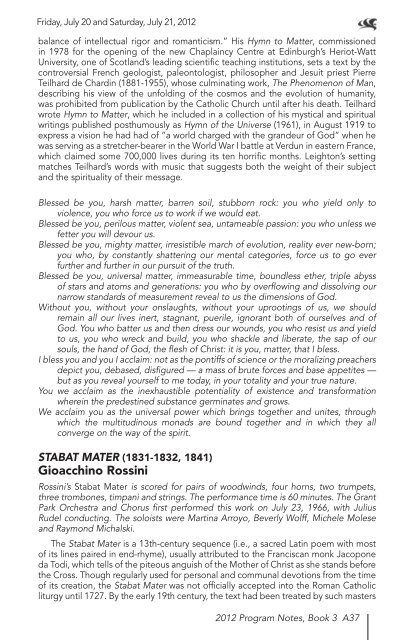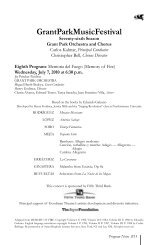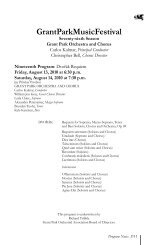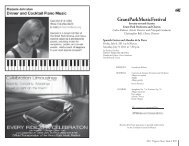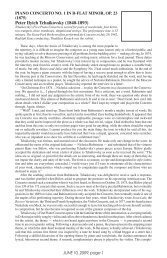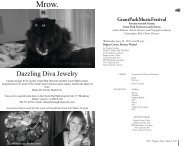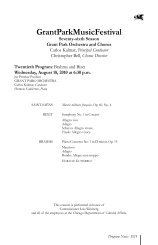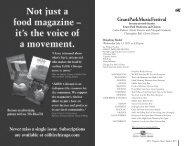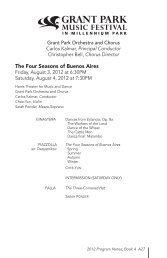rossini's Stabat Mater - The Grant Park Music Festival
rossini's Stabat Mater - The Grant Park Music Festival
rossini's Stabat Mater - The Grant Park Music Festival
You also want an ePaper? Increase the reach of your titles
YUMPU automatically turns print PDFs into web optimized ePapers that Google loves.
Friday, July 20 and Saturday, July 21, 2012<br />
balance of intellectual rigor and romanticism.” His Hymn to Matter, commissioned<br />
in 1978 for the opening of the new Chaplaincy Centre at Edinburgh’s Heriot-Watt<br />
University, one of Scotland’s leading scientific teaching institutions, sets a text by the<br />
controversial French geologist, paleontologist, philosopher and Jesuit priest Pierre<br />
Teilhard de Chardin (1881-1955), whose culminating work, <strong>The</strong> Phenomenon of Man,<br />
describing his view of the unfolding of the cosmos and the evolution of humanity,<br />
was prohibited from publication by the Catholic Church until after his death. Teilhard<br />
wrote Hymn to Matter, which he included in a collection of his mystical and spiritual<br />
writings published posthumously as Hymn of the Universe (1961), in August 1919 to<br />
express a vision he had had of “a world charged with the grandeur of God” when he<br />
was serving as a stretcher-bearer in the World War I battle at Verdun in eastern France,<br />
which claimed some 700,000 lives during its ten horrific months. Leighton’s setting<br />
matches Teilhard’s words with music that suggests both the weight of their subject<br />
and the spirituality of their message.<br />
Blessed be you, harsh matter, barren soil, stubborn rock: you who yield only to<br />
violence, you who force us to work if we would eat.<br />
Blessed be you, perilous matter, violent sea, untameable passion: you who unless we<br />
fetter you will devour us.<br />
Blessed be you, mighty matter, irresistible march of evolution, reality ever new-born;<br />
you who, by constantly shattering our mental categories, force us to go ever<br />
further and further in our pursuit of the truth.<br />
Blessed be you, universal matter, immeasurable time, boundless ether, triple abyss<br />
of stars and atoms and generations: you who by overflowing and dissolving our<br />
narrow standards of measurement reveal to us the dimensions of God.<br />
Without you, without your onslaughts, without your uprootings of us, we should<br />
remain all our lives inert, stagnant, puerile, ignorant both of ourselves and of<br />
God. You who batter us and then dress our wounds, you who resist us and yield<br />
to us, you who wreck and build, you who shackle and liberate, the sap of our<br />
souls, the hand of God, the flesh of Christ: it is you, matter, that I bless.<br />
I bless you and you I acclaim: not as the pontiffs of science or the moralizing preachers<br />
depict you, debased, disfigured — a mass of brute forces and base appetites —<br />
but as you reveal yourself to me today, in your totality and your true nature.<br />
You we acclaim as the inexhaustible potentiality of existence and transformation<br />
wherein the predestined substance germinates and grows.<br />
We acclaim you as the universal power which brings together and unites, through<br />
which the multitudinous monads are bound together and in which they all<br />
converge on the way of the spirit.<br />
<strong>Stabat</strong> <strong>Mater</strong> (1831-1832, 1841)<br />
Gioacchino Rossini<br />
Rossini’s <strong>Stabat</strong> <strong>Mater</strong> is scored for pairs of woodwinds, four horns, two trumpets,<br />
three trombones, timpani and strings. <strong>The</strong> performance time is 60 minutes. <strong>The</strong> <strong>Grant</strong><br />
<strong>Park</strong> Orchestra and Chorus first performed this work on July 23, 1966, with Julius<br />
Rudel conducting. <strong>The</strong> soloists were Martina Arroyo, Beverly Wolff, Michele Molese<br />
and Raymond Michalski.<br />
<strong>The</strong> <strong>Stabat</strong> <strong>Mater</strong> is a 13th-century sequence (i.e., a sacred Latin poem with most<br />
of its lines paired in end-rhyme), usually attributed to the Franciscan monk Jacopone<br />
da Todi, which tells of the piteous anguish of the Mother of Christ as she stands before<br />
the Cross. Though regularly used for personal and communal devotions from the time<br />
of its creation, the <strong>Stabat</strong> <strong>Mater</strong> was not officially accepted into the Roman Catholic<br />
liturgy until 1727. By the early 19th century, the text had been treated by such masters<br />
2012 Program Notes, Book 3 A37


